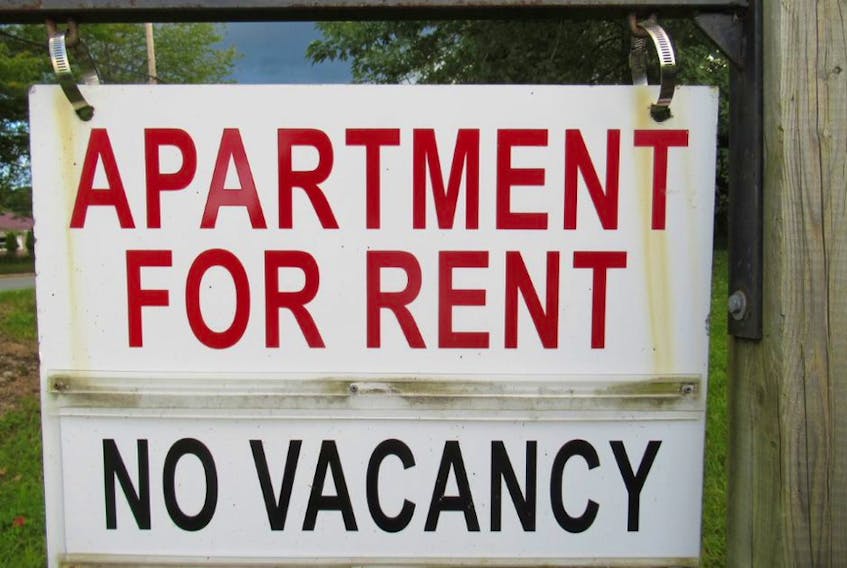CHARLOTTETOWN, P.E.I. — After two years of drafts and political finger-pointing, the province’s legislature has passed a retooling of laws governing tenants and landlords.
The Residential Tenancy Act (RTA), the first major overhaul of tenancy laws in over 30 years, will replace the Rental of Residential Property Act.
But the province is currently in a period of transition; until cabinet signs off on the new Residential Tenancy Act, the province’s current Rental of Residential Property Act still governs landlords and tenants.
The new RTA is expected to fully become law sometime in the spring.
In an email, Jaclynne Hamel, communications advisor with the Island Regulatory and Appeals Commission (IRAC), which oversees tenancy matters, confirmed the commission has received “a sharp uptick” in inquiries from landlords and tenants about the new tenant provisions, including questions over what rental increases are permitted.
On December 1, 2022, An Act to Amend the Rental of Residential Property Act (No.2) was passed in the PEI legislature limiting the maximum allowable rent increase to 0% on all rental units for the period between January 1, 2023 to December 31, 2023. Important things to know 🧵:
— PEIRAC (@irac_pei) December 2, 2022
Here are some takeaways from the changes to tenancy law that came out of the fall’s legislature sitting.
1. Rent for most tenants probably won’t increase in 2023
Both the current act and new RTA are clear: the maximum allowable rental increase in 2023 is zero.
Even if a landlord has notified tenants of the previously allowed rent increases in 2023, rents cannot increase in 2023.
There is an exception to this. Landlords can apply to IRAC for a greater than allowable rent increase. The new RTA sets these at a maximum of three per cent.
But landlords cannot unilaterally impose rent increases in 2023 without the approval of IRAC.
2. Tenants need to be notified
In September, IRAC issued an order stating rent increases of between five and 10 per cent would be allowed in 2023. This was later nullified by MacKay’s bill amending the current act.
This bill requires landlords to notify tenants of the nullified increase if they have already issued tenants a notice of the increase for 2023.
IRAC has posted suggested language for this on its website.

3. Maximum three per cent starting 2024
The new RTA will limit yearly allowable rent increases to three per cent, starting in 2024.
However, landlords can apply to IRAC to increase rent above this amount, up to an additional three per cent.
This means that, if a landlord obtains an order from IRAC, the maximum amount rent in any unit can increase each year is six per cent, starting in 2024.
4. First right of refusal
The current rental housing shortage has given rise to cases of “renoviction” in which tenants have been evicted to allow cosmetic renovations and/or an increase in rent of units.
Landlords can still evict tenants to conduct extensive renovations to a unit. But the new RTA requires landlords obtain permission from IRAC to do so, after having first obtain the necessary permits and approvals.
In those cases, tenants are entitled to six months’ notice – up from two months in the current act. Tenants also have the right of first refusal, meaning they can choose to occupy the rental unit once renovations are done.
If a landlord fails to allow a tenant to occupy a renovated unit, the new RTA says the landlord must compensate the tenant for three months’ rent plus moving expenses.
If a tenant does not exercise a first right of refusal, they are entitled, upon giving notice to the landlord, to compensation of one month’s rent plus moving expenses from the landlord.

5. Bad faith
The new RTA sets a maximum $10,000 penalty for persons found to have acted in “bad faith.” This could apply to cases involving a renoviction or other repeated instances of individuals who ignore tenancy law.
6. Renoviction moratorium
An amendment to the new RTA, introduced by Green MLA Hannah Bell, maintained an existing moratorium in the current act on renovation-related evictions until Nov. 1 of 2023.
The amendment allows for an exception in cases where renovations are necessary to protect the property or health of tenants.
7. No gouging of subletters
Section 30 of the new RTA will prohibit tenants from charging subletters more than their monthly rent.

8. Written inspections
Section 18 of the new RTA requires landlords and tenants “or their authorized agents” to conduct in-person inspections of their units on the first day of tenancy.
A landlord must offer a tenant at least two opportunities for this inspection. If a tenant does not participate, the landlord must provide them with a written copy of the report.

9. Domestic violence and discrimination
In cases where a tenant has experienced domestic violence and wishes to leave a unit, the new RTA prohibits a landlord from entering the apartment to show a prospective tenant the unit until it has been vacated.
Another amendment, introduced by Liberal MLA Gord McNeilly, similarly limits landlord entry to units in which tenants have experienced discrimination from the landlord.
10. Cabinet’s hand
Section 7 of the new RTA allows cabinet to appoint the director of residential tenancy.
In the current act, IRAC is tasked with the power to appoint the director of residential property.
Stu Neatby is a political reporter with the SaltWire Network in Prince Edward Island. He can be reached by email at [email protected] and followed on Twitter @stu_neatby.









